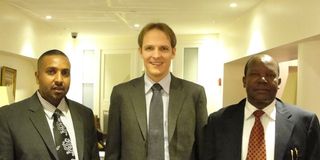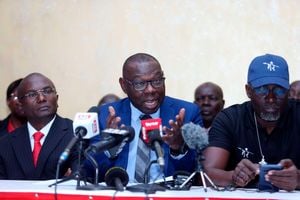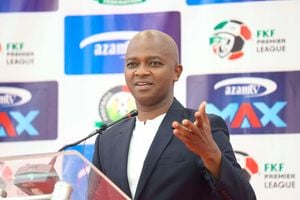
Kenya Football Federation senior vice chairman Twaha Mbaraka (left), German lawyer Stefan Kroll (centre) and KFF chairman Sam Nyamweya in Lausanne on the day of the hearing of their case against Fifa at the Court of Arbitration for Sports on January 25, 2010.
On Saturday, former Kenya international Sammy “Kempes” Owino dropped a bombshell when he announced he was suing world football governing body Fifa at the Court of Arbitration for Sports (CAS) in Lausanne, Switzerland.
Owino, who also played for giant Kenyan clubs Gor Mahia and Luo Union, revealed at a press conference in Nairobi that he was pleading with the international body established to settle disputes related to sport through arbitration to compel Fifa to form a Football Kenya Federation Normalisation Committee to oversee the upcoming football polls in the country.
The former Harambee Stars great, who has declared his intention of vying for the federation’s top seat, said this was the only way that the elections would be conducted freely and fairly, and importantly, above board to the extent that the exercise would not attract any litigation.
“This path will immunize the current election process against actual and possible judicial challenges. These challenges are inevitable given the current football situation regardless of who wins the upcoming elections,” said Owino.
He has a point. Football management in Kenya has been a story of one court case after another over the past four years.
In fact, FKF held a hurriedly announced Special General Meeting on August 24 soon after the High Court had revoked stay orders obtained by journalist Milton Nyakundi on July 30 stopping the federation officials from conducting affairs of the football body pending a hearing questioning the legality of the same officials to be in office.
The High Court had earlier on March 15 suspended an FKF Annual General Meeting scheduled for the following day.
A day before Owino’s announcement, seven football county associations moved to court seeking to stop the implementation of resolutions passed in the FKF SGM including approving the electoral code and electoral board.
It is instructive that the Sports Disputes Tribunal annulled the FKF polls of 2020 twice over legality and eligibility issues, and then allowed the third election results to stand on condition that the federation met the provisions of the 2013 Sports Act within 90 days.
Owino’s case was filed on Tuesday by one of Kenya’s leading civil and criminal litigation lawyers, Charles Ouma. This is not the first time a Kenyan or Kenyans have taken Fifa to CAS.
In 2009 officials of a parallel Kenya Football Federation (KFF) sued Fifa at the Lausanne-based tribunal for recognizing a rival Kenya Football Limited (KFL) as the football body mandated to run football in the country. The two factions had been feuding since holding parallel AGMs in May 2007.
The hearing was held at CAS chambers in Lausanne on January 26, 2010
The KFF officials led by then chairman Sam Nyamweya, senior vice chairman Twaha Mbarak and secretary general Omondi Aduda, through their lawyer Charles Ouma argued that Fifa had erred in approving the transformation of a KFF lead by chairman Mohammed Hatimy and Titus Kasuve from a sports body registered under the society’s act into a private company, Kenya Football Limited.
Hatimy had argued that KFL was the only body registered and mandated to run football in the country and was backed by the government.
Fifa initially attempted to stop the case from proceeding, its director of legal affairs then, Marco Villiger, contending that the Nyamweya group was time barred in lodging the suit.
The Hatimy faction had registered KFF as KFL with the Registrar of Companies in 2008 with the tacit approval of Fifa.
FKL thereafter developed its own 84-article constitution based on FIFA Statutes, together with a Memorandum and Articles of Association specifying objectives and a governance structure.
The Hatimy-led federation then convened an extraordinary general assembly on 15th of that month where the delegates ratified the monumental transformation.
However, a month later on December 22 the Registrar of Societies confirmed Nyamweya’s faction as the bona KFF office which meant the Hatimy group had no legal status to convene a general assembly.
Interestingly, the Hatimy group produced a letter written by Kenya Prime Minister then Raila Odinga recognising FKL as the legally mandated body to run football in Kenya.
Nyamweya’s side argued that they had been duly elected and registered in line with Kenyan laws. CAS ruled in April 2010 that FKL be in charge of Kenyan football reasoning that KFF was not a member of Fifa.
However, behind the scenes, according to Twaha, Fifa recognized that they had made a grave mistake by accepting a private company to run football in a country, something that had never happened before in the world.
“They promised to send a delegation to Kenya so that all stakeholders including the rival factions sit together and agree to dissolve KFF and KFL and form a new body. An all-inclusive election was held under the supervision of IEBC and that is how we came up with FKF.”
Fife representatives Ashford Mamelodi of Botswana and Leodegar Tenga of Tanzania indeed came to Kenya to help bring all parties together and hold elections. Nyamweya became the first president of Kenya’s football body under the FKF name in 2011.
Twaha, who has also shown interest in vying for the FKF presidency, is now seeking to be enjoined in Owino’s case at CAS as Kenyan football squabbles return to the Lausanne sports arbitration body.
“This legal issues must be resolved otherwise the chaos will continue,” said Twaha.







